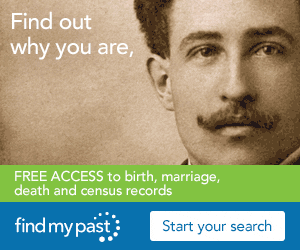Blog


Start Your Canadian Genealogy Research: Library and Archives Canada
Jump start your Canadian genealogy research and celebrate Canada’s 150th birthday! Here are tips for you to start your Canadian genealogy research. Already started? Take it to the next level with resources at Library and Archives Canada.

 Canada is celebrating 150 years of nationhood in 2017! To join the party, I invited Claire Banton from Library and Archives Canada to the Genealogy Gems podcast episode 199. We had a great chat about Canada’s history and its planned year-long celebration. And of course, our conversation quickly turned to tips for exploring your Canadian roots at Library and Archives Canada.
Canada is celebrating 150 years of nationhood in 2017! To join the party, I invited Claire Banton from Library and Archives Canada to the Genealogy Gems podcast episode 199. We had a great chat about Canada’s history and its planned year-long celebration. And of course, our conversation quickly turned to tips for exploring your Canadian roots at Library and Archives Canada.
Quick Tips for Canadian Genealogy Research
You can listen to our entire conversation for free in episode 199, but here are some quick take-away tips:

Claire Banton obtained her Masters of Library and Information Studies degree in 2006. She has worked in Reference Services at Library and Archives Canada for 10 years, where she has enjoyed learning something new every day. She is currently Chief, Orientation Services, where she works with an awesome team who help people search for information. She loves being an information detective and helping people overcome their research challenges.
1. Library and Archives Canada is very different from the average library.
It is both a national library (search the library catalog here) and a national archive (search the archival catalog here). And you don’t even have to have an account to search.
2. Start with the LAC website genealogy resources page whether you plan to visit in person or not.
You’ll find loads of free databases and some digitized records that haven’t been indexed yet, but are ripe for browsing. The topics page will tell you more about what is available for Canadian genealogy.
3. Familiarize yourself with the history of border crossings.
There was no border control from the US to Canada prior to 1908, so that means there are no Canadian records of earlier crossings. However, there is a database containing an index of aliens and citizens crossing into the U.S. from Canada via various ports of entry along the U.S.-Canadian border between 1895 and 1956 at FamilySearch.org and Ancestry.com.
4. Call LAC directly for quick Canadian genealogy answers.
Schedule a Skype call with a genealogy expert to get a more in depth answer. (This is awesome – well done LAC!) Set the expert up for success and get the most out of your call by providing background information ahead of time.
Click here to explore (and join) Canada’s 150th birthday celebration!
More Canadian Genealogy Tips
Search Canadian Passenger Lists for FREE at Library and Archives Canada
Here’s Why Quebec Church Records are a Great Place to Look for Ancestors

Finding Family History in WWII Newspapers: Narrowing the Results
Newspapers can fill in the gaps to the long-lost stories of your ancestors. These tips will help you narrow your search in digitized WWII newspapers for experiences directly relating to the war and to the lives of your ancestors.

In this previous post, I provided step-by-step tips for locating WWII-era newspapers. Those tips helped you locate the actual newspapers. In this post, I’ve got 7 tips for to help you focus on narrowing down a large list of results in search of war-related family stories.
Tip 1: Try Various Name Combinations in WWII Newpapers
If you are keyword searching in digitized newspapers, remember to try different name combinations. A man may be identified by just his first initial and last name. During the 1940s, a woman might be referred to as “Mrs. Ted Johnson” instead of Barbara Johnson.
Tip 2: Search for Addresses
You might find a family identified as “the Johnson’s of 132 Cherry Lane,” so try using street addresses in your searches, remembering that “Lane” might be spelled out or abbreviated. You may also find the family listed by their town or township. An example of this might be “the Johnson’s of Brown township,” or “the Johnson’s of Conover.”
Tip 3: Expand Your Search to Events and Organizations
Use any search terms you already know about for your family in World War II: a military unit, a battle or local service organization, or a war effort project that the folks back home may have helped out with. Do family stories mention rationing, air raid drills, bomb shelters, blackout rules, or one of the women getting a job at a certain factory? All these make excellent search terms.
Tip 4: Take Time to Browse
Browsing the pages will give you a sense of how the war affected everyday life at home. You may find recipes that make the most of ration allowances and reminders about blackout rules and curfews. You may even find tips on how to conserve gasoline or how to be fashionable without silk stockings!
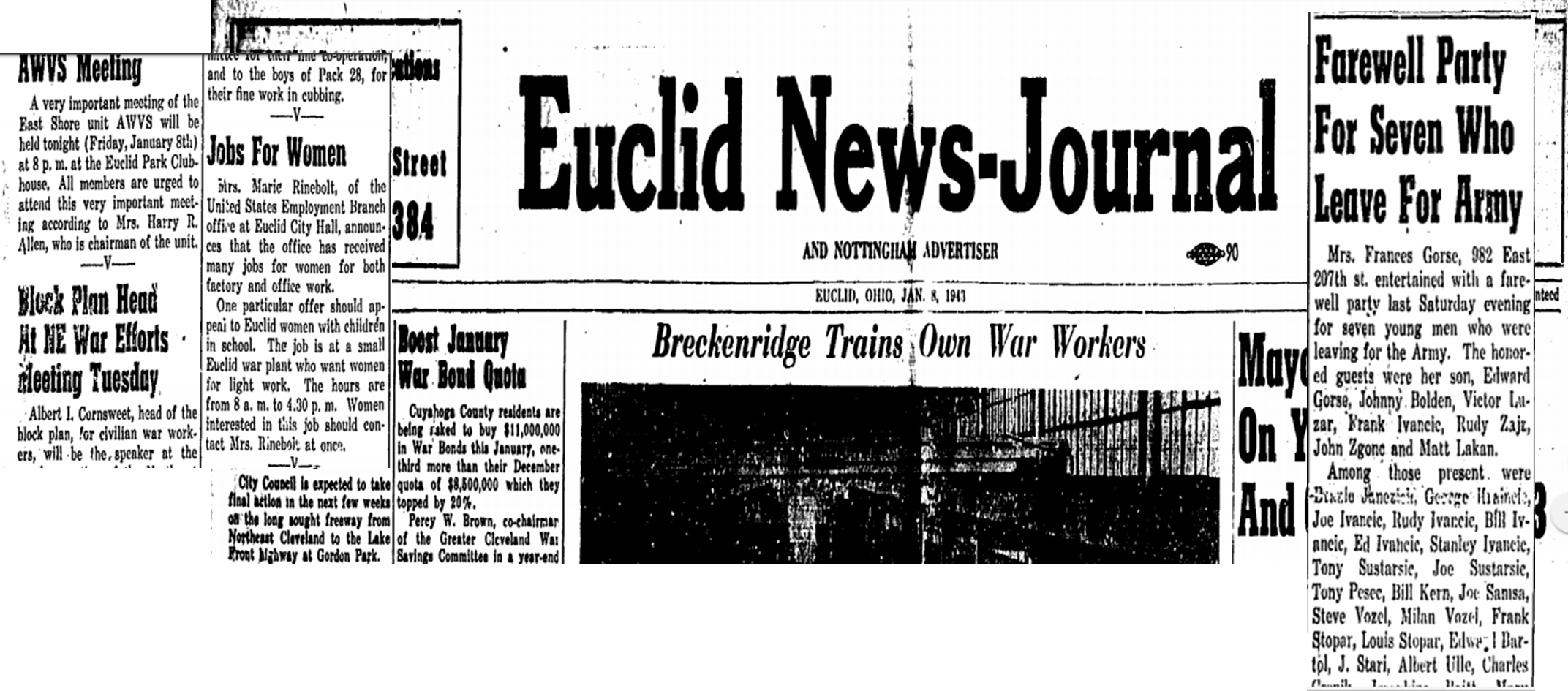
Almost every news item on the front page of this Jan 8, 1943 issue of the Euclid News Journal (OH) has to do with the war. It’s easy to see how the war affected everyday life of this small Ohio city on the shores of Lake Erie. Issues of this paper are searchable at the Euclid Public Library website (click image to view more issues.)
Tip 5: Be Aware of Newspaper Stoppages
If your family lived in an area that came under attack or was occupied, the local newspapers may have stopped printing. In that case, search other papers to see if they reported what was going on in your ancestor’s town.
Tip 6: Keep an Eye on the Homefront
For relatives who served in the military, watch for updates in local papers about how they were faring on the fronts during the war. Watch for casualty lists of the wounded, dead, and missing. Here’s something cool: newspapers also printed maps showing the progress of the war on the various fronts.
Tip 7: History Provides Hints
If you’re looking for reports about soldiers’ bodies returning home and funeral services, it will help to know that according to an article in The Wall Street Journal, the War Department didn’t start bringing back remains until the fall of 1947 because of the huge logistical challenges involved. Over 93,000 American soldiers who died in World War II are buried overseas in one of the American Battle Monuments Commission cemeteries.
Making the Most of Newspapers for Family History
 Find more tips like these in my book, How to Find Your Family History in Newspapers. You’ll find step-by-step instructions for my foolproof research process, along with everything you need for success: worksheets and checklists, tons of free online resources (and websites worth paying a few bucks for), a massive amount of location-specific websites (U.S. and international)–and a case study that puts it all to the test!
Find more tips like these in my book, How to Find Your Family History in Newspapers. You’ll find step-by-step instructions for my foolproof research process, along with everything you need for success: worksheets and checklists, tons of free online resources (and websites worth paying a few bucks for), a massive amount of location-specific websites (U.S. and international)–and a case study that puts it all to the test!
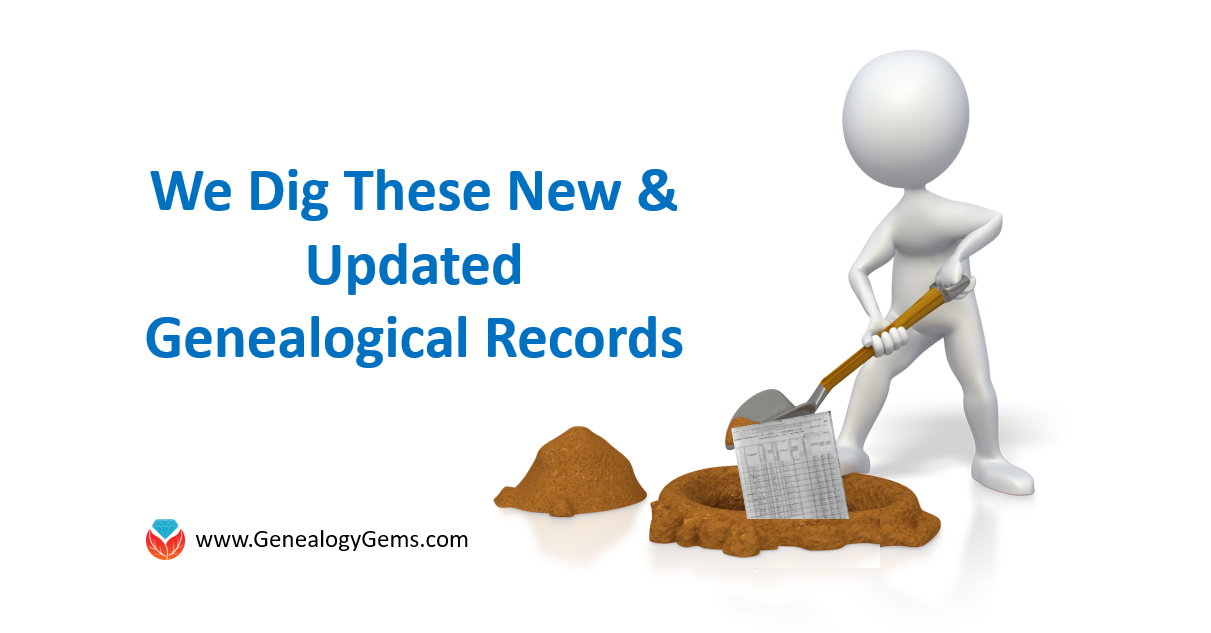
Sacramental Records Now Searchable Online in New and Updated Genealogical Records
Special thanks to the New England Historic Genealogical Society and the Archdiocese of Boston for their effort to make Sacramental records for genealogy available online. These and other new and updated genealogical collections are mentioned in this weeks list from the United States, Ireland, United Kingdom, Italy, and free record searches at Findmypast!
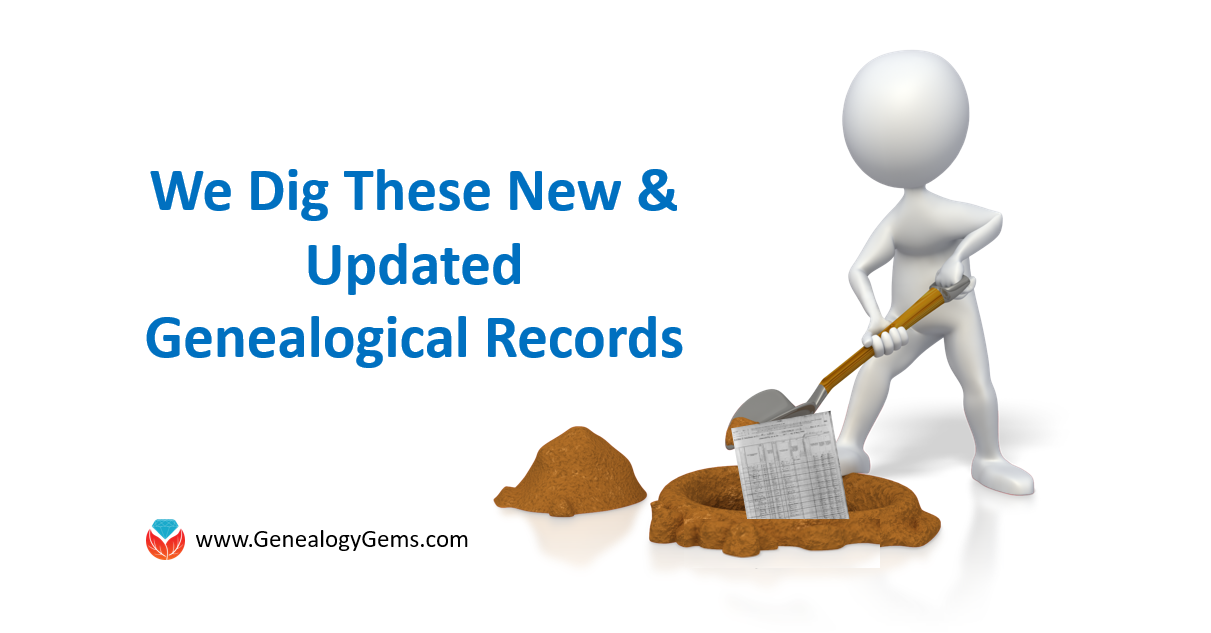
United States (New England area) & Canada – Sacramental Records for Genealogy
NEHGS has announced the New England Historic Genealogical Society (NEHGS) and Archdiocese of Boston have made millions of 18th and 19th century sacramental records searchable online.
United States – Oklahoma- Vital Records
Ok2Explore is a free searchable index of births and deaths that occurred in the state of Oklahoma. Only limited information is available for births occurring more than 20 years ago and deaths occurring more than 5 years ago.
Visitors to the site may search the index using any combination of the subject’s name, date of event (birth or death,) county of event, and sex of the subject.
Remember this is only an index version of the record, but you can order certified copies for a fee.
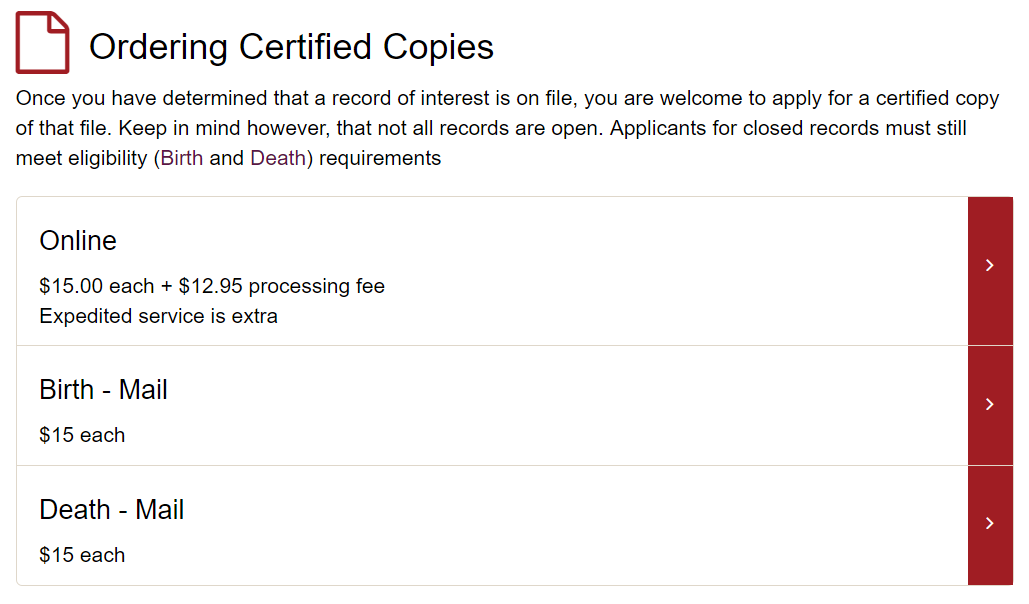
Ireland – Petty Sessions
New and updated genealogical collections this week include the Ireland, Petty Sessions Court Registers at Findmypast.
With over 227,700 new records, the petty sessions handled the bulk of lesser criminal and civil legal proceedings in Ireland. Ireland, Petty Sessions Court Registers now contains over 22.8 million records and is the largest collection of Irish court & prison records available anywhere online. Each record includes a transcript and a scanned image of the original document. These documents will include details of victims, witnesses and the accused, such as an address, date in court, details of the offence, details of the verdict, and the sentence.
Cases range from merchants who had not paid duty on their goods, to workers suing for unpaid wages. Farmers were sometimes fined for letting their cattle wander or for allowing their cart to be driven without their name painted on the side. Public drunkenness was a common offence, as was assault and general rowdiness. Though these records are not considered typical for finding vital information, they can work as great clues to lead you to the information you need.
United Kingdom – Dorset – Memorial Inscriptions
The Dorset Memorial Inscriptions collection at Findmypast contains over 40,000 new records. The collection contains details of inscriptions found on gravestones, tombs, monuments and even stained glass windows throughout 266 parishes within English county.
Each record includes a transcript. The information contained varies, however, most will include a combination of birth year, death year, burial date and location, relative’s names, memorial type and notes on the inscription.
United Kingdom – Warwickshire – Burials
Also at Findmypast, over 175,000 new records have been added to the Warwickshire Burials. The entire collection now contains more 1 million records and includes monumental inscriptions from Clifton Road Cemetery in Rugby.
Each record includes a transcript of the original burial registry or details from the monumental inscription. While the information listed will vary depending on the records original source, most will include your ancestor’s name, age, birth year, death date, burial year, burial location and the name of the officiating minister. A number of records will also include parent’s names and residence. Inscriptions will include information recorded on the individual’s grave stone and will usually include the name of the individual’s spouse, children and/or parents. Also, some grave sites may have more than one person buried in the same plot.
United Kingdom – Northumberland & Durham – Monumental Inscriptions
Over 16,000 records for the Northumberland & Durham Monumental Inscriptions at Findmypast are now available. These include the full description found on a grave stone or monument which will often include additional family names and dates.
Each record includes a transcript of the original source material. The amount of information may vary due to the age and legibility of individual monuments, but most records will include birth date, burial year, burial place, death date, denomination, inscription, and even the type of stone their monument was made from.
Ireland – Quaker Congregational Records
Also at Findmypast, Ireland, Society Of Friends (Quaker) Congregational Records has been updated with an additional 5,000 congregational records. Congregational records include details of the meetings your ancestor’s attended and the activities they engaged in. This is a nice way to enrich your family story.
These records, dating back to the mid-1600s, include minutes from half-yearly Quaker meetings. Each entry includes an image of the original handwritten record. The information included will vary, but most will include the congregation date, address, meeting, archive and reference.
MyHeritage Year End Review
MyHeritage had some pretty exciting things going on in 2016. In their recent blog post, “A Look Back at 2016,” you will see the list including the MyHeritage mobile app, the introduction of Tribal Quest, the debut of the beautiful Sun Chart, and their recent announcement of MyHeritage DNA, just to name a few. Visit the blog post to see the MyHeritage year-in-review for yourself!
Venezuela – Australia – El Salvador – Philippines – Netherlands – Canada – Spain – Slovenia – U. S. – Italy
FamilySearch.org took a short break over the holidays from updating their collections, but with the start of the new year, they have added and updated over 20 collections from all over the world! Check out these great records:
Free Record Searches at Findmypast
Findmypast is offering a free records search weekend from January 12 – 15th, 2017. Don’t miss this amazing opportunity!
For records in the United Kingdom, click here.
For records in the US, click here.
For records in Ireland, click here.
